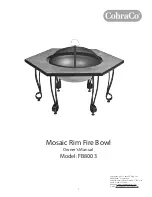
16
GB
Start-up and testing
MAINTENANCE REGULATIONS (for authorised personnel)
!
CAUTION! Follow the general warnings and the safety norms listed at the
beginning of the text and keep to all the instructions given under all circumstances.
All maintenance operations and interventions should be performed by qualified personnel (i.e. with the
necessary requirements as outlined in the applicable norms in force).
Before calling the Technical Assistance service in the event of a suspected malfunction, you should first check whether
this is due to other causes, such as (for example) a temporary power failure or a water shortage.
Electrical connections
The device's relief outlet must be connected to a relief pipe having a diameter at least identical to that of the equipment
connection. Use a funnel that creates an air gap of at least 20 mm and allows for visual inspection, in order to prevent
personal injury, property damage or harm to animals in case the device itself intervenes. In such cases, the manufacturer
shall not be held liable for the consequences. Connect the inlet of the pressure safety device to the mains cold water
with a flexible hose, using a cut-off valve if necessary (D Fig. 2). Furthermore, a water discharge tube on the outlet
(C Fig. 2) is also necessary if the drainage tap is opened.
Avoid overtightening the pressure safety device and do not tamper with it.
It is normal for water to trickle from the pressure safety device during the heating phase; for this reason, it is necessary
to connect the outlet, which must always be left exposed to the atmosphere, to a drainage pipe that slopes downwards
and towards an area not subject to frost. If the mains pressure is close to the calibrated valve values, a pressure
reducer must be installed as far as possible from the appliance.
Should you wish to install the mixer units (taps or shower), drain any impurities from the pipes as they could cause
damage.
The water heater's working life is affected by the operation of the galvanic anti-corrosion system, therefore it cannot
be used when the water hardness is permanently below 12
°
F.
However, in the presence of particularly hard waters, there will be a considerable and rapid formation of limescale
inside the appliance, with a consequent loss in efficiency and damage to the electric heating element.
Before performing any type of work, disconnect the appliance from the electricity mains using the external
switch.
For added safety, contact qualified personnel to carry out a careful inspection of the electrical system to ascertain
whether it complies with the applicable standards, as the appliance manufacturer shall not be held liable for any
damages caused by the lack of ear thing of the system or for faults in the electricity supply.
Make sure that the system is able to withstand the maximum power absorbed by the heating element (refer to the data
plate) and check that the cross-section of the electrical cables is adequate and conforms to current standards.
Do not use multiple outlet sockets, extension cables or adaptors.
Do not use the piping from the water, heating and gas systems for the appliance earthing connection.
If the appliance is supplied with a power supply cable, should the latter need to be replaced, use a cable having the
same characteristics (type H05VV-F 3x1.5 mm
2
, 8.5 mm diameter) The power supply cable (type HO5 V V-F 3x1.5
diameter 8.5 mm) must be introduced into the appropriate hole situated on the rear side of the appliance and fed
through to the terminal block (M Fig. 4); lastly, secure the single wires by tightening the relevant screws.
To disconnect the appliance from the mains, use a bipolar switch that complies with all the applicable CEI-EN regulations
(min. contact opening 3 mm; it should preferably include fuses).
The appliance must be earthed and the earth wire (which must be yellow-green and longer than the others) must be
connected to the terminal marked with the symbol (G Fig. 4).
Secure the power supply cable onto the cap using the special cable clamp supplied with the appliance.
Prior to operating the machine, make sure that the mains voltage conforms to the value indicated on the appliance
data plate.
If the appliance is not supplied with a power supply cable, choose one of the following installation modes:
- connection to the fixed mains supply using a rigid pipe (if the appliance is not supplied with a cable clamp);
- with flexible cable (type H05VV-F 3x1,5mm
2
, diameter 8.5 mm), if the appliance is supplied with a cable clamp.
Before powering the appliance, fill the tank with mains water.
It must be filled by opening the domestic circuit main tap and hot water tap, until the air is completely released. Visually
check for water leaks from the flange and slightly tighten it, if necessary.
Energise the system from the switch
Содержание VENCON ECO 100
Страница 142: ...142 SI ...
Страница 144: ...144 SI ...
Страница 148: ...A C B A D 2 1 3 A B 5 5 4 3 2 1 4 K Z M C G F Y M W P ...
Страница 149: ...Z F C 7 6 N 5 V X ...
Страница 151: ......
Страница 152: ......
















































